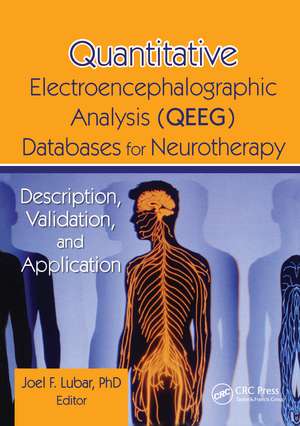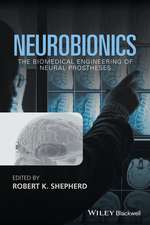Quantitative Electroencephalographic Analysis (QEEG) Databases for Neurotherapy: Description, Validation, and Application
Autor Tim Tiniusen Limba Engleză Paperback – 12 ian 2004
Quantitative Electroencephalographic Analysis (QEEG) Databases for Neurotherapy: Description, Validation, and Application examines the strengths and limitations of QEEG databases as a tool for the diagnosis of neurological and psychiatric disorders. This book is written by experts who have had considerable experience in either the development of databases or in working with them. This text can improve your ability to fine-tune existing protocols and develop new ones leading to better treatment, better long-term outcome, and fewer training sessions.
Quantitative Electroencephalographic Analysis (QEEG) Databases for Neurotherapy can help you differentiate cognitive states, clinical disorders, and EEG changes throughout the lifespan of a patient. This book also reveals the latest technological developments and methodological practices, and comparisons are made between EEG databases to help you determine what is best for your needs. Several controversies involving quantitative EEGs are discussed, including ethical concerns and early criticisms against the use of these methods for diagnostic purposes.
This book addresses important topics such as:
- the development of methodology for estimating the deviance from the database norms to determine abnormal brain functioning
- the most widely used QEEG databases—their construction and application as well as a comparison and contrast of their features
- the creation of a universal set of standards for determining which database is suitable for a researcher’s or practitioner’s needs
- the use of quantitative EEG and normative databases for clinical purposes—ethical concerns, advantages and limitations, and the proposal for a new clinical approach for neurotherapy
- the comparison of QEEG reference databases in analysis and in the evaluation of Adult Attention Deficit Hyperactivity Disorder
Preț: 210.76 lei
Preț vechi: 221.84 lei
-5% Nou
Puncte Express: 316
Preț estimativ în valută:
40.34€ • 41.100$ • 34.09£
40.34€ • 41.100$ • 34.09£
Carte disponibilă
Livrare economică 18 februarie-04 martie
Livrare express 01-07 februarie pentru 21.55 lei
Preluare comenzi: 021 569.72.76
Specificații
ISBN-13: 9780789004888
ISBN-10: 0789004887
Pagini: 200
Ilustrații: illustrations
Dimensiuni: 148 x 210 x 13 mm
Greutate: 0.32 kg
Ediția:1
Editura: CRC Press
Colecția CRC Press
ISBN-10: 0789004887
Pagini: 200
Ilustrații: illustrations
Dimensiuni: 148 x 210 x 13 mm
Greutate: 0.32 kg
Ediția:1
Editura: CRC Press
Colecția CRC Press
Public țintă
Professional and Professional Practice & DevelopmentCuprins
Foreword, Preface, SCIENTIFIC ARTICLES, Parametric and Non-Parametric Analysis of QEEG: Normative Database Comparisons in Electroencephalography, a Simulation Study on Accuracy, Use of Databases in QEEG Evaluation, Quantitative EEG Normative Databases: A Comparative Investigation, Databases or Specific Training Protocols for Neurotherapy? A Proposal for a Clinical Approach to Neurotherapy”, Quantitative EEG Normative Databases: Validation and Clinical Correlation, Comparison of QEEG Reference Databases in Basic Signal Analysis and in the Evaluation of Adult ADHD, Index, Reference Notes Included ,
Descriere
Quantitative Electroencephalographic Analysis (QEEG) Databases for Neurotherapy: Description, Validation, and Application examines the strengths and limitations of QEEG databases as a tool for the diagnosis of neurological and psychiatric disorders. Written by experts who have had considerable experience in either the development of databases or in working with them, this book can improve your ability to fine-tune existing protocols and develop new ones leading to better treatment, better long-term outcome, and fewer training sessions. Comparisons are made between currently available databases to help you determine what is best for your needs. This volume will be helpful to both novice and advanced neurotherapists, as well as medical doctors, psychiatrists, psychologists, licensed social workers, registered nurses, and biofeedback providers.












